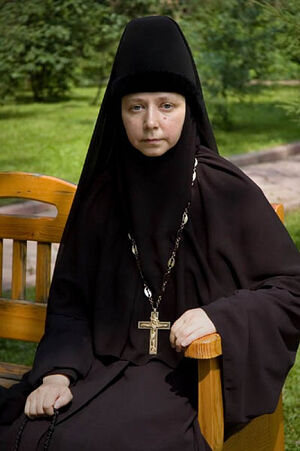We offer our readers this talk by Abbess Domnica, abbess of St. Alexander Nevsky Novo-Tikhvin Convent in Ekaterinburg, given to the sisterhood on happiness and on what prevents us from being happy.
 “Plowman of old times” by Radov Lachezar.
“Plowman of old times” by Radov Lachezar.
At the beginning of our talk I would like to read an excerpt from a letter of St. Nikolai (Velimirovic) of Ohrid and Zica. His spiritual daughter asked him: “Why does the Gospel say nothing about happiness?” This is what he replied:
My dear, why do you think it does not? It seems the Gospel talks about human happiness more than about anything else! I think the Gospel can be called the book of happiness, and the lesson Christ teaches us, a lesson about happiness. Are you confused by the absence of the very word ‘happiness’ in it? But there are other words in the Gospel in its place, for example, joy, delight, Paradise, blessedness. Blessedness means supreme happiness. Do you know what the main lesson is that Christ taught us? The lesson about happiness. The Orthodox Church repeats it to people during every Divine Liturgy by singing the Beatitudes.
This is what St. Nikolai answered to his spiritual daughter. Indeed, can it be true that the Gospel didn’t say a word about happiness and didn’t give an answer to the question that interests human beings the most: “What is happiness and how is it acquired”? The Lord Who came to earth began His preaching precisely by answering this question. And by His answer He made happiness very close to all humanity—it can even be said that He handed it to us.
We usually imagine happiness as something that is far away from us and won’t come until external circumstances have changed. Some think: “If I change my job, I’ll be happy”; others say: “If I have different neighbors, I’ll feel good”; and others believe that in order to be happy they need to take a trip. There are even people who think that if they change the shape of their noses, their lives will be completely transformed. And people do this. But in many cases when people get what they want, they find no happiness in it. People feel shock and sometimes even lose the purpose of life. This occurs every time someone chases his dream or idea. By this he guarantees his unhappiness. Elder Aimilianos (Vafeidis) explains why it happens this way:
When something interests us, when we crave for earthly things and pursue them persistently, we become unhappy, thinking about our ambitions and the desires of our hearts and not about God.
 Abbess Domnica (Korobeinikova) A person becomes unhappy when he begins to chase the things that arise from his heart—that is, fantasies, passions… And that is his most tragic mistake. In pursuit of the products of his imagination he overlooks true blessedness.
Abbess Domnica (Korobeinikova) A person becomes unhappy when he begins to chase the things that arise from his heart—that is, fantasies, passions… And that is his most tragic mistake. In pursuit of the products of his imagination he overlooks true blessedness.
And seeing this agonizing problem that all people have, the Lord provided a solution to it. He said, “Don’t search for happiness far away. You don’t need to run, rush or hurry to obtain it. Blessedness is near at hand—it is within you.” And then He explained what genuine happiness is by giving us the Beatitudes. If we abide by them, we will attain blessedness.
Someone may argue: “How can I follow the Beatitudes? They are of such a high order and are so hard to live by!” In reality, it is quite possible to follow all of them. And this path is accessible to everyone. Here is what St. Paisios of Mt. Athos said about this:
Whatever happens to us, let it be a reason for gratitude and not something to dwell on.
Gratitude is the means by which a person fulfils all the Beatitudes and becomes happy.
Everything that surrounds us or happens to us can become a theme to dwell on. “Why does he/she behave this way? Why do I have this work? Why is it snowing/raining again? Why are things going wrong again?” Of course, then we don’t feel happy or blessed at all. However, if we begin to give thanks, for instance, by saying, “Lord Jesus Christ, Son of God, glory to Thee!”—not only by the tongue but with all our being—soon we’ll feel blessedness. By giving thanks we express our deep humility, meekness, and our longing for purity of heart—that is, everything that Christ stated in the Beatitudes.
St. Nikolai (Velimirovic) wrote a very interesting parable of a nobleman who lived in a palace in comfort and prosperity. Though he had everything he could dream of, a deep melancholy took possession of him. So he decided to go on a journey to relax a little. He rode on horseback for a long time but didn’t see anything interesting. At length he reached a field with a plowman and two oxen on it. And an unusual sight met his eyes. Now I will read you the rest of the story:
The nobleman saw one ox lying on the ground, the other ox standing yoked, and the plowman kneeling in the furrow, with his arms spread up to heaven, exclaiming over and over again: ‘Glory to Thee, O Lord! I thank Thee!’ Bewildered, the noble dismounted from the horse, came up to the plowman and asked,
“What are you giving thanks to God for so fervently?”
“One of my oxen has died,” the plowman responded.
“And you are praising God for this?” the rich man asked, surprised.
“Yes, exactly for this.”
“I don’t understand it,” the noble continued. “Someone else would be weeping, moaning and complaining about the injustice of heaven and earth, while you are giving thanks to God! Explain please, what for?”
The plowman sighed and said,
“I am a sinner, and that is why this misfortune has befallen me. The Lord has taken one of my oxen instead of punishing me with death. I cannot help but praise Him!”
The nobleman was even more surprised and asked him again,
“How are you going to plow with only one ox?”
“God will sort things out!” the plowman replied with a slight smile on his shining face.
And the nobleman realized that although he lived in a palace, he has not smiled as brightly as that poor peasant for years. He took several gold coins out of his pocket and offered them to him.
“Take them and buy another ox. Today I have learned a lot from you,” he said to the peasant.
The peasant exclaimed with joy,
“Didn’t I tell you, my lord, that God would sort things out?”
The peasant lifted his hands towards heaven and repeated loudly again,
“I thank Thee, O Lord! I thank Thee, O Lord!”
Though this could have been the end of the parable, it has a continuation. St. Nikolai related that after that encounter the nobleman rode back to his palace—only to find it in flames. What did the nobleman do? He knelt down, lifted up his arms towards heaven and exclaimed, “I thank Thee, O Lord! I thank Thee, O Lord!”
And he said to the servants who had been stunned by his behavior, “Calm down! I have not given thanks to God for so many years, though He has given me everything. Let me begin to do it now, when the Lord is taking everything away from me. It’s time for me to work—this is what I need to do in order to regain my purpose in life.” And the nobleman set about building a new house with his own hands. And, as St. Nikolai writes:
“The nobleman livened up, cleared his mind, and his spirits rose. And from that day on the rich man gave thanks to God for everything every day.”
This is how St. Nikolai concludes his parable. This story sounds like a fairy-tale, but it describes real things. Indeed, no one who thanked God was deceived. Thankfulness opens our eyes, so that we begin to see how God works in various life circumstances and pours out His love on us. It is natural for us to be grateful to the Lord continuously, for every human being has something to thank God for every minute.
On the contrary, those who don’t thank God deceive themselves all the time. Such people are deceived by their own thoughts. In most cases everything is fine with them and the Lord has blessed them abundantly, except for some specific thing that they consider to be a serious problem. And they may think about this “defect” for thirty years running, making themselves unhappy. For example, some think they have bad parents: “I wish I was born into a different family; then I would be happy.” Others assert that all their misfortunes were caused by their ginger hair, something they were bullied for in school. Others complain that they didn’t go to the best school and didn’t get a higher education. Their minds are clouded by such thoughts and they don’t even see the numerous blessings of God their lives are filled with. God endowed one person with many talents and everybody admires him, but a minor negative thought may make him unhappy! This is what St. Paisios the Hagiorite used to say about this:
Why do we allow ourselves to think nonsense and to be tempted by trifles, like, ‘Why did he say this to me? Why did he look at me that way? Why did he take a glass and go there and not here?’ And thousands of other childish things!
Thus thoughts can deceive us, blind us, and make our lives gloomy. In order to avoid this we should always control our hearts. As soon as we notice that something is going to upset us and the following thought is creeping into our mind: “I am unhappy because such-and-such has happened to me or I don’t have such-and-such a thing”, let’s be vigilant, knowing that trusting such thoughts is a terrible blunder. Thoughts of this kind may emerge in unexpected everyday situations or when someone bears a grudge or grief for a long time. Let’s make efforts, be watchful, let these thoughts go by without conversing with them; and let’s constantly feel gratitude to God in our hearts. Let us recall the wise words of Elder Paisios once again:
Whatever happens to us, let it be a reason for gratitude and not something to dwell on.
The secret of happiness is in these few words. Happiness is not in possessing some external things or changing circumstances; it is in giving thanks for everything, and through this being at peace with God and feeling His love. As St. Silouan of Mt. Athos said:
I used to think that happiness is here on the earth, that I was healthy, handsome, wealthy and loved by others. This filled me with vainglory. But I have regarded all the happiness in the world as mist that is carried away by the wind since I came to know the Lord by the Holy Spirit. And the grace of the Holy Spirit gladdens and delights the soul, which contemplates the Lord deep in the spiritual realm.




